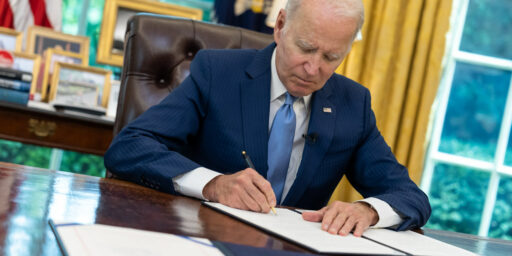California Decriminalizes Marijuana
Governor Schwarzenegger has signed a bill making pot possession (at certain levels) the equivalent of a traffic ticket.
 Via the San Francisco Chronicle: State downgrades pot possession to infraction
Via the San Francisco Chronicle: State downgrades pot possession to infraction
Citing the need to reduce spending on prosecution and courts, Gov. Arnold Schwarzenegger signed a measure that makes marijuana possession an infraction, on par with traffic and littering tickets.
[…]
“In this time of drastic budget cuts, prosecutors, defense attorneys, law enforcement and the courts cannot afford to expend limited resources prosecuting a crime that carries the same punishment as a traffic ticket,” wrote Schwarzenegger, who opposes Proposition 19, the marijuana initiative.
The law, which takes effect immediately, reduces possession of up to an ounce of marijuana – enough for about 30 joints – from a misdemeanor to an infraction. Already, marijuana possession was the only misdemeanor under California law that didn’t allow for jail time.
Quite frankly, this makes fiscal sense given the previous state of the law:
The penalty for possessing less than an ounce of marijuana was already limited to a $100 fine and potential, court-mandated treatment.
Really, why expend the money for court appearances and other related costs?
Beyond that, however, this is clearly indicative of an ongoing shift towards marijuana use.
The immediate political implications is how it will effect voting on Proposition 19, which would legalize marijuana outright in CA. On the one hand the new measure further destigmatizes marijuana usage to some degree, yet on the other it removes one of the arguments for Prop 19, i.e., that it would help reduce the costs associated with marijuana prosecutions.
In regards to Prop 19 itself, see: On Legalizing Marijuana in California. That post underscores the conflict between state and federal laws on this subject. Such a contrast is quite relevant because any real change to the true fundaments of the drug war on marijuana has to come from a national change in policy, not state-level reforms. And there are powerful fiscal arguments for doing so at that level as well.






about damned time
I’m in favor of this too. I don’t smoke nor do drugs, but something has to be done about the wildly unsuccessful War on Drugs. It is just another signature boondoggle being perpetrated by the government. Hope they decriminalize selling it too.
“Such a contrast is quite relevant because any real change to the true fundaments of the drug war on marijuana has to come from a national change in policy, not state-level reforms.”
Steve: if the Feds can not foist any of the costs of this “war” onto the states… what do you think the GOP will do? Yah…. I know…. math is not their strong point (or yours)(i don’t think I have read you trash the “Pledge to America” yet) but Americans can count… Sooner or later, the “War on Drugs” has to be payed for.
By whom?
@Tom P.:
I am unclear as to why you are dishing on me on this topic. As I have written before, mostly on my own blog, I think that the War on Drugs has been a colossal waste of money and a failure.
My point is simply that the major problem with actually settling the war on drug in terms of marijuana will require a very substantial change to federal law, specifically the Control Substances Act.
And, by the way, there is plenty of federal spending in this policy area so it is not so simple as simple stopping the “foisting.”
If this was meant to depower the initiative, I’d think it might have an opposite effect. People seem to be voting in favor because they think it’s inevitable. Contributing to the slide, sort of reinforces that.
Of course, if it is just money savings, that would seem to make straightforward sense, as James says.
wondertrash;
Almost,anyway![lol]